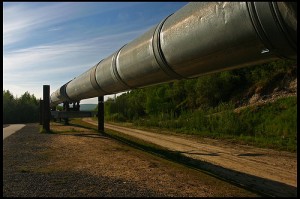Shwe Gas Pipeline, A Sign of Things to Come
By Burma Partnership • July 29, 2013 On 28 July, Burma’s Ministers of Energy, the Vice President, the Ambassador of China and a representative from South Korea started the Shwe Oil and Gas Pipeline. It was reported that when the “torches flamed in the sky of Namkham Measuring Station of [Burma]-China Gas Pipeline, a storm of applause and cheers broke out on the ceremony site and Namkham Metering Station.” This image is disturbing: representatives from China, international business and the government of Burma cheered the flames, but no such excitement was felt among the local communities or representatives from social or environmental groups in ethnic areas.
On 28 July, Burma’s Ministers of Energy, the Vice President, the Ambassador of China and a representative from South Korea started the Shwe Oil and Gas Pipeline. It was reported that when the “torches flamed in the sky of Namkham Measuring Station of [Burma]-China Gas Pipeline, a storm of applause and cheers broke out on the ceremony site and Namkham Metering Station.” This image is disturbing: representatives from China, international business and the government of Burma cheered the flames, but no such excitement was felt among the local communities or representatives from social or environmental groups in ethnic areas.
The dual pipelines will travel almost 800km, beginning in Arakan State, passing through Magway and Mandalay Regions and exiting Burma through Northern Shan State. They will cross through various ethnic nationality areas as well as diverse ecosystems, from jungles to mountain ranges.
The pipelines will also traverse ongoing ethnic conflict areas. As recently as April, an international security consultant advised against opening the pipeline due to its path through conflict areas, and warned of the potential for catastrophe.
Civil society has continually highlighted the severe environmental destruction resulting from the project, the increased military presence and associated human rights violations, and the exclusion of local groups and affected communities. The pipelines will supply the government of Burma with multi-billion dollar revenues and a power hungry China, but little gas and oil will be directed for domestic consumption.
Local communities have overwhelmingly objected to the project and groups monitoring the project have documented numerous human rights violations and irreversible environmental impacts. Little consultation has occurred with affected communities and the harm mitigation policies that should be undertaken with a project of this scope have been notably absent.
The start of the Shwe Gas Pipeline is coming at the same time as numerous other large scale development projects are being implemented, such as the resumption of the Letpadaung Copper Mine, a new plan and funding for the Tavoy Deep Sea Port project, and a search for investors for road projects.
Sadly problems show no sign of abating. One of the previous issues with the Letpadaung mine was that there was no public consultation. The government of Burma and the Wan Bao Company just restructured their contract again with no public consultation or input from affected villagers: “In the past there were problems because they signed the contract without informing the public,” said Khin San Hlaing, a lawmaker and member of the parliamentary committee tasked with investigating the mining project after the crackdown. “Now they have done it again, failing to inform the public.”
Large-scale development projects have the potential to improve the lives of citizens in impoverished areas; the focus must be on this goal, the goal of improvement for the people of Burma, not the benefit to military or corrupt officials, not Chinese resource companies and not multi-national businesses. Burma has one of the lowest levels of access to power anywhere in the world yet the vast majority of the oil and natural gas from the dual pipelines will be exported. The emergence of international business previously denied entry into Burma comes with the expectation that best business practices and international standards will be maintained; yet local communities are not consulted, land is confiscated and the environment destroyed. How this development takes place and who develops are questions that will shape Burma as much as the dictators of the past and sadly have just as much potential for destruction for generations to come.
Tags: Burma Partnership, Development Project, Human Rights Violations, Shwe Gas ProjectThis post is in: Blog
Related PostsBurma Partnership Celebrates Continuing Regional Solidarity for Burma and Embraces the Work Ahead for Progressive Voice
Burma Army Displays Blatant Disregard for 21st Century Panglong Peace Process
Ann Din Coal Power Plant: Local Movement and Action to Preserve and Protect Natural Resources and Land: Mon IDP Report Case Study #4
Latest Human Rights Abuse Case Demonstrates Urgent Need to Reform the Myanmar National Human Rights Commission
Human Rights Far From Guaranteed as US Sanctions on Burma Are Removed









 All posts
All posts